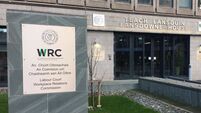3,000 diagnosed with epilepsy every year: 'Increased awareness needed'

Dr Daniel Costello, a consultant neurologist at Cork University Hospital (CUH)
A consultant neurologist in Cork has highlighted the importance of increased epilepsy awareness in sports, club settings and schools. Dr Daniel Costello, a consultant neurologist at Cork University Hospital (CUH), hopes that increased awareness of epilepsy and seizures can lead to greater participation among those who have the condition.
Around 31,000 people over the age of 18 across Ireland have epilepsy - some 70% have their condition controlled while 30% have active epilepsy, meaning they have had a seizure in the past year.
Approximately 67 discharges involving people with a primary or secondary diagnosis of epilepsy are reported from acute hospitals weekly, while around 3,000 people are diagnosed with epilepsy each year.
Speaking to The Echo, Dr Costello explained that people with epilepsy, particularly teenagers and young adults, are wary of taking part in sports, clubs or school events in case they have a seizure in public.
He said that increased awareness of epilepsy and what to do in the event of a seizure among those in charge of clubs and school settings could lead to greater participation from those with the condition.
“Epilepsy is common,” Dr Costello explained. “It’s very common in school children in both primary and secondary school.
“There are different types of epilepsy and many reasons as to why people develop it. “For every 100 children attending a primary or secondary school, on average there will be one child with epilepsy,” he added.
“People who live with epilepsy may retreat away from activities in public, on the sports field or in schools.
“It’s a common theme when you speak to people with epilepsy that they might be nervous or afraid of having a seizure in public, partly for themselves and partly because they know people might be uncomfortable with someone having a seizure in public.
“This can cause them to retreat away from sports and school activities.
“Any organisation, whether it’s a school, sports club or social club, people should have some awareness as to what epilepsy is and how to cater for people with it,” said Dr Costello. “If you look at things like migraines, diabetes or asthma, which are also very common, people are a lot more comfortable dealing with them in situations.
“In the case of epilepsy, people can often be quite nervous about it and I think that feeds into the anxiety that is prevalent in those with the condition.
Dr Costello recently took part in a conference on epilepsy, hosted by FutureNeuro, in a bid to raise awareness of the condition among those in sporting organisations and schools.
FutureNeuro is the Science Foundation Ireland (SFI) Research Centre for Chronic and Rare Neurological Diseases.
“The reason for the talk was to highlight how common epilepsy actually is and to enhance people’s awareness of the condition,” explained Dr Costello. “People may not fully comprehend what epilepsy entails. “Broadly speaking, there are two types of epileptic seizures - convulsive and non-convulsive.” Convulsive seizures involve the whole body and are the most dramatic type of seizure, causing rapid, rhythmic and sometimes violent shaking movements.
A non-convulsive seizure manifests primarily as altered mental status that can see people become confused, agitated and their behaviour might become odd or strange.
When asked what to do in the event of someone having an epileptic seizure, Dr Costello said: “Coaches, mentors, managers and teachers should be aware that they have a child with epilepsy under their care.
“If it’s a young child, they should speak to their parents about what to do, and if it is an older teenager or young adult, they will be able to give their own account.
“In the case of convulsive seizures, stay calm and keep your distance if they’re agitated. “If they’re going to fall to the ground, which they frequently do, try to protect them in that. If they’re on the ground, try putting them on their side, stay with them and time the seizure.
“We know that the longer the seizure is, the more dangerous it is so timing the seizure and having that information for the paramedics, if an ambulance is called, is very helpful,” he added.
“Stay with them and get someone else to call an ambulance while you time the seizure.
“Certainly if it is a prolonged event, anything longer than two minutes, an ambulance should be called.
“If their head is hitting the ground, put something under their head to protect them.
“Most of the public would recognise a convulsive seizure but many may not recognise a non-convulsive episode,”
Dr Costello explained further. “These can involve a person behaving unusually - they may be unresponsive, agitated, perplexed or disorientated.
he advised.
“After the two-minute mark, you should call an ambulance, especially for a convulsive seizure.”
Dr Costello highlighted the opportunity for people to learn more on the Epilepsy Ireland website, which has resources and information on epilepsy and what to do in the event of a seizure.
“They have great information and an instructional video on what to do if someone has a seizure and I would highly recommend watching that. “If you’re in a school or club, having some awareness about the children who have epilepsy and what needs to be done in case of a seizure is very important,” he added.
Dr Costello also encouraged clubs, societies and schools to offer the opportunity for coaches, mentors and teachers to learn how to manage common medical conditions, including epileptic seizures.
“It would allow people to know what to do in the event of a basic medical event, such as a seizure or asthma attack,” he said. “I don’t think one-to-one training is necessary but it’s important that people know there are resources and learning material out there.
“Epilepsy Ireland is a great source of information and educational material for the public.”
Dr Costello hopes that increased awareness of epilepsy and how to manage it can lead to greater participation in school events and sports among the cohort of young people who have the condition. “If the public at large and people in authority are comfortable with someone under their care having epilepsy and even can have seizures, I think that will foster confidence and trust and will see children and young adults more likely to participate,” he said.
“It’s something that teenagers and young adults do fear, having a seizure in public, and I think that it can, among other difficulties we all experience, have an impact on teenagers dropping out of sport and other activities.
“There’s a lot of goodwill among teachers, coaches and the general public and we saw that at the conference recently but there is also an element of fear about someone having a seizure in public.
“Greater awareness can ensure people are more comfortable with that.”







 App?
App?


